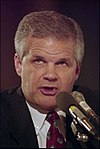| |||||||||||||||||
| |||||||||||||||||
 Parish results Johnston: 50–60% 60–70% 70–80% 80–90% Jenkins: 50-60% | |||||||||||||||||
| |||||||||||||||||
| Elections in Louisiana |
|---|
 |
The open primary election for the 1978 United States Senate election in Louisiana was held on September 16, 1978.
Contents
Incumbent Senator J. Bennett Johnston won the election with 59.40% of the vote and was declared elected by a majority, dispelling the need for a general election in November.

